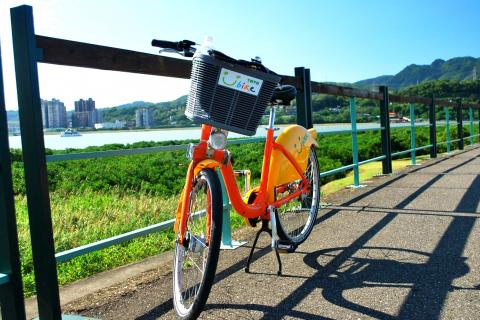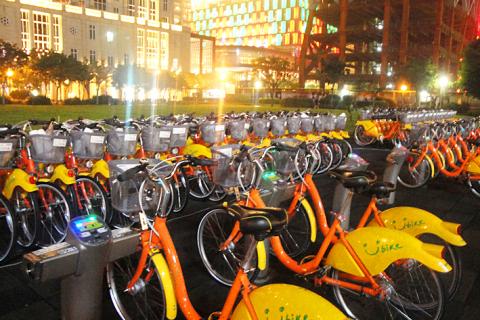Walking into bowels of Taipei’s Mass Rapid Transit system for the first time can be a bewildering experience. The same can be said about the Taipei City Government’s highly ambitious Youbike bicycle sharing system. But once you’ve signed up, used the service once or twice and figured out where the stations are, Youbike is a breeze.
Since Youbike stations are popping up all over the city, the Taipei Times wanted to get some feedback from users. There are two ways to get started with Youbike — EasyCard or credit card. If you already have an EasyCard, simply go to the Web site (www.youbike.com.tw/home.php) and click on the member icon. After following the instructions in English or Chinese, an SMS is sent to your mobile phone for confirmation and you can head directly to any of the stations to use a Youbike. The first 30 minutes of every rental are free and every 30 minutes after that is NT$10.
On the road

Photos: Marcus Aurelius and Lindsey Leamen
Using a credit card should be even easier, since all riders have to do is go to a Youbike kiosk and flash the credit card (as long as it has a microchip) and pick a bicycle. However, the credit card service is only available at 31 out of the 41 stations (mostly in the Xinyi District, 信義), and this is only marked on the physical map, not the one on the Youbike Web site.
Kate Lin (林雅婷) learned about Youbike from her co-worker and now uses the service at least twice a week.
“I enjoy doing this because I don’t get much chance to exercise during the week,” Lin said. “Also, there’s only one bus I can take home, and sometimes I have to wait a long time for it. Riding Youbike [home from work] is faster than that.”

Photo: Marcus Aurelius and Lindsey Leamen
Lin isn’t completely satisfied, though. “The registration machine at the station nearest my house is always broken,” she said. “Also, one time I couldn’t find any vacant places to return the bike, so I could only wait there until someone came to rent another bike.”
Lindsey Leamen, who prefers using the bikes for longer trips, thinks the service could be improved by adding more stations in places that aren’t in the main areas of the city.
“I work in Neihu and would love to have the option of biking to work in nice weather, and then taking the MRT home if the weather turns bad, which is a common occurrence in Taipei.”
Convenient service
Overall, Leamen believes the service is convenient because it provides a list of stations, a real time listing of how many bikes are there at that particular time and how many empty spaces are available.
“The first time I used a bike, I borrowed it for three and a half hours and it only cost me NT$60. That’s amazing, especially considering there’s a similar bike share program in Toronto and for half the time I ended up getting charged the equivalent of NT$700. Oh, and I love the baskets!”
Alex Trup, an avid Youbike rider, thinks it has a lot of potential. “It is very well-priced and if you are a light user, you will rarely pay anything,” he said. “I even made it once from Taipei City Hall to Academia Sinica in Nangang within the free time.”
Youbike hasn’t expanded to where Trup lives yet, but he still believes the service will improve. “Taipei is a great city for cycling because it has plenty of paths, generally flat terrain, and on some days, gorgeous weather. YouBike will solidify Taipei’s position as one of the world’s greatest cities for cycling.”

On April 26, The Lancet published a letter from two doctors at Taichung-based China Medical University Hospital (CMUH) warning that “Taiwan’s Health Care System is on the Brink of Collapse.” The authors said that “Years of policy inaction and mismanagement of resources have led to the National Health Insurance system operating under unsustainable conditions.” The pushback was immediate. Errors in the paper were quickly identified and publicized, to discredit the authors (the hospital apologized). CNA reported that CMUH said the letter described Taiwan in 2021 as having 62 nurses per 10,000 people, when the correct number was 78 nurses per 10,000

As we live longer, our risk of cognitive impairment is increasing. How can we delay the onset of symptoms? Do we have to give up every indulgence or can small changes make a difference? We asked neurologists for tips on how to keep our brains healthy for life. TAKE CARE OF YOUR HEALTH “All of the sensible things that apply to bodily health apply to brain health,” says Suzanne O’Sullivan, a consultant in neurology at the National Hospital for Neurology and Neurosurgery in London, and the author of The Age of Diagnosis. “When you’re 20, you can get away with absolute

May 5 to May 11 What started out as friction between Taiwanese students at Taichung First High School and a Japanese head cook escalated dramatically over the first two weeks of May 1927. It began on April 30 when the cook’s wife knew that lotus starch used in that night’s dinner had rat feces in it, but failed to inform staff until the meal was already prepared. The students believed that her silence was intentional, and filed a complaint. The school’s Japanese administrators sided with the cook’s family, dismissing the students as troublemakers and clamping down on their freedoms — with

As Donald Trump’s executive order in March led to the shuttering of Voice of America (VOA) — the global broadcaster whose roots date back to the fight against Nazi propaganda — he quickly attracted support from figures not used to aligning themselves with any US administration. Trump had ordered the US Agency for Global Media, the federal agency that funds VOA and other groups promoting independent journalism overseas, to be “eliminated to the maximum extent consistent with applicable law.” The decision suddenly halted programming in 49 languages to more than 425 million people. In Moscow, Margarita Simonyan, the hardline editor-in-chief of the